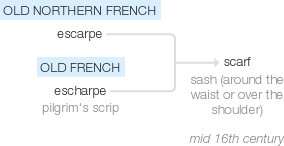Scarf
mid 16th century (in the sense ‘sash (around the waist or over the shoulder)’): probably based on Old Northern French escarpe, probably identical with Old French escharpe ‘pilgrim's scrip’.
wiktionary
Probably from Old Northern French escarpe (compare Old French escharpe(“pilgrim's purse suspended from the neck”)). The verb is derived from the noun. Doublet of scrip.
Of uncertain origin. Possibly from Old Norse skarfr, derivative of skera(“to cut”).
Generally thought to be a variant, attested since the 1950s, of scoff(“eat (quickly)”) (of which scorf is another attested variant), itself a variant of scaff. [1] [2] Sometimes alternatively suggested to be a dialectal survival of Old English scearfian, sceorfan(“gnaw, bite”) (compare scurf). [3]
From Old Norse skarfr.
etymonline
scarf (n.1)
"band of silk, strip of cloth," 1550s, "a band worn across the body or over the shoulders," probably from Old North French escarpe "sash, sling," which probably is identical with Old French escherpe "pilgrim's purse suspended from the neck," perhaps from Frankish *skirpja or some other Germanic source (compare Old Norse skreppa "small bag, wallet, satchel"), or from Medieval Latin scirpa "little bag woven of rushes," from Latin scirpus "rush, bulrush," of unknown origin [Klein]. As a cold-weather covering for the neck, first recorded 1844. Plural scarfs began to yield to scarves early 18c., on model of half/halves, etc.
scarf (n.2)
"connecting joint," late 13c., probably from a Scandinavian source (such as Old Norse skarfr "nail for fastening a joint; diagonally cut end of a board," Swedish skarf, Norwegian skarv), from Proto-Germanic *skarfaz (source also of Dutch scherf), from PIE root *sker- (1) "to cut." Also used as a verb. Also borrowed into Romanic (French écart, Spanish escarba).
scarf (v.)
"eat hastily," 1960, U.S. teen slang, originally a noun meaning "food, meal" (1932), perhaps imitative, or from scoff (attested in a similar sense from 1846). Or perhaps from a dialectal survival of Old English sceorfan "to gnaw, bite" (see scarf (n.2)); a similar word is found in a South African context in the 1600s. Related: Scarfed; scarfing.
